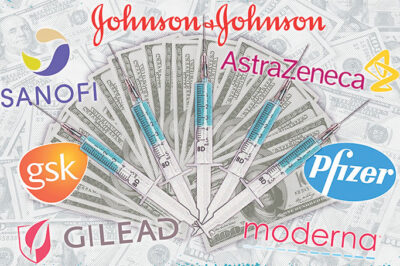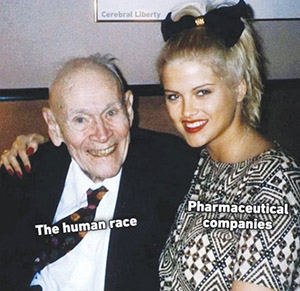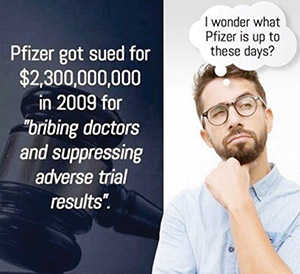From New Dawn Special Issue Vol 17 No 2 (Apr 2023)
More than a decade ago, the US drug giant Pfizer was described as a “habitual offender” by the journal, Healthcare Policy. Between 2002 and 2009, the company had forked out $3 billion in civil and criminal penalties.
But Pfizer is far from being the only one. At the end of 2019, the Australian Department of Health and Aged Care’s Therapeutic Goods Administration (TGA) fined the UK-based multinational, Mundipharma, more than $300,000 for 24 infringements over the company’s relations with medical professionals in its efforts to promote opioids, which were marketed as TARGIN. “[A]dvertising to health professionals was misleading, imbalanced and otherwise inaccurate,” says the TGA. It was “in breach of the requirements of the Medicines Australia Code of Conduct regarding promotional materials directed to health professionals.” According to TGA guidelines, opioids should not be advertised as a core element of managing non-cancer pain, yet the company’s promotional material did exactly that.
Pharmaceutical giants have a long history of criminal behaviour, some of which involve killing people by selling dangerous products for profit, while others involve killing people by raising prices on life-saving medicine and suing for the production of generics. Regulators tend to give companies a financial slap on the wrist and thus enable them to continue their gangster operations while appearing to take public health seriously. Mundipharma generates an annual $2 billion, so a $300k fine is hardly a deterrent.
Smaller pharmaceutical companies, particularly those developing drugs derived from natural substances and not synthetic chemicals, are receiving comparable fines. In September last year, the TGA fined three domestic firms specialising in cannabinoid-based products: Cannatrek, Little Green Pharma, and MGC Pharmaceuticals, which shares its headquarters with Europe. The companies were accused of promoting prescription-only medical cannabis, including products not on the Register of Therapeutic Goods.
Why are regulators going after natural and natural-based producers? ABC Australia reported on the “secretive relationship” between companies and government advisors, which the report said “is enough to make you sick.” But I thought conspiracies were just a theory and you’d be a fool, a weirdo, and even a menace to society to believe and promote them? In 2012, Bond University’s Ray Moynihan said: “The TGA has confirmed to me there is no public disclosure of the financial relationships between drug companies and the professionals who advise Australia’s drug regulator.” In 2017, Dr Wendy Bonython and Associate Professor Bruce Arnold of Canberra University’s Health Research Institute told the Senate that the TGA needed a complete overhaul. They said: “There needs to be a clear break between the regulator and the parties they’re trying to regulate.” In August last year, the BMJ (formerly British Medical Journal) cited professionals who advocated changing the “TGA’s structure and function, arguing that the agency has become too close to industry.”
One could reasonably assume that the New York Times, with all its bias and spin, would at least cover penalties imposed by courts on major drug companies. Yet, from 1970, when Pfizer and others won major court appeals, to the early-2000s when increasing numbers of fines were imposed, the archive contains hardly any information. This suggests that successfully suing drug giants is a relatively new phenomenon. Most of the information contained in this article, therefore, comes from the post-Millennium period. What follows are the top ten global (mostly US-based) pharmaceutical and biotech companies, by market capitalisation, and a sample of their criminal history.
ABBVIE
AbbVie was founded in Chicago in 2013 as a spinoff from Abbott Laboratories. The parent company has a sordid history. The earliest fine I can find dates back to 1975 when the company’s lawyers accepted guilt but entered a no plea in a case where the corporation was fined just $1,000 for adulterating and misbranding intravenous solutions. Since then, Abbott and its subsidiaries have been fined millions of dollars in the US for committing various crimes, including environmental, consumer and labour violations, and false claims and the promotion of unapproved or off-label products.
The fines have become increasingly steep. In 1999, Abbott had to pay $100 million over its production of diagnostic devices that did not meet federal regulations. The biggest was a near-record $1.5 billion in 2012 for illegally marketing the anti-epileptic drug Depakote as a dementia drug.
Abbott’s spin-out, AbbVie, has an even worse record, given its nascence. For instance, in 2016 a company called Teva Pharmaceuticals bought another company called Allergan. In 2020, Allergan was purchased by AbbVie. But Allergan was bogged down in lawsuits relating to its alleged role in America’s opioid crisis. In 2022, AbbVie agreed to clear the lawsuits for Teva to the tune of $2.37 billion so that AbbVie and Teva could agree a deal worth $6.6 billion.
ASTRAZENECA
The Anglo-Swedish firm AstraZeneca is known for its COVID “vaccine” being withdrawn from more than a dozen countries over fears that it causes blood clots. In June 2021, after previously being described by the Australian government as building a “pathway to normal,” it was announced that the government would withdraw the product in favour of Pfizer’s jab.
The company was formed in 1999 when Sweden’s Astra AB merged with Britain’s Imperial Chemical Industries (ICI). Between 1948 and 1960 with intermittent help from Australia, Britain invaded and fought “communists” in Malaya (now Malaysia and Singapore), during which time the military engaged in chemical warfare, spraying defoliant over swathes of jungle in order to identify the hidden enemy and drive villagers into British-run concentration camps. The Colonial Office reckoned that ICI saw it as “a lucrative field for experiment.”
In the 1970s, ICI fabricated toxicology and efficacy reports into its PP796 chemical, an additive to the paraquat pesticide. ICI scientist Jon Heylings described it as “a conspiracy within the company to keep this quiet.” Company documents show that 1980s’ efforts to introduce a diluted and less deadly compound were rejected, as they would “destroy Group profit from paraquat.” In 2010, as AstraZeneca, the company paid $520 million after it “illegally marketed the anti-psychotic drug Seroquel for uses not approved as safe and effective by the [US] Food and Drug Administration.”
BRISTOL-MYERS SQUIBB
BMS was founded in 1989 when Bristol-Myers merged with the Squibb corporation. In 1937, for instance, Bristol-Myers was ordered by the US Federal Trade Commission to stop presenting its hair tonic, Vitalis, as a baldness cure. In 1941, to give another example, E.R. Squibb and other companies were accused by the US Department of Justice of fixing insulin prices.
But they did much worse. In the 1940s, Bristol Laboratories, the Squibb Institute, the Rockefeller Foundation, and the Johns Hopkins University tested their new penicillin products on Guatemalans: over 400 of whom were deliberately infected with syphilis without their knowledge or consent.
This spirit of deception has followed the company into more recent history. In 2007, BMS was fined $515 million for illegally marketing drugs. Attorney R. Alexander Acosta of the Southern District of Florida said that the company “fraudulently inflated the cost of a drug used primarily to reduce the side effects of cancer treatments and other generic drugs without regard to the increased costs borne by government health care programs or elderly and indigent patients.”
GLAXOSMITHKLINE
Now stylised as GSK, the British company was formed in 2000 when Glaxo Wellcome merged with SmithKline Beecham. For 40 years, Glaxo scientists warned in secret that chemicals used in the production of the company’s ulcer drug, Zantac, were potentially carcinogenic, but the company covered it up. The story broke in 2019 when researchers found potentially significant cancer-causing elements in the drug. One year later, the US Food and Drug Administration (FDA) recalled the product.
In the ‘90s, SmithKline Beecham was fined by the Hungarian government for exaggerating the efficacy of its hepatitis B vaccine. In the US, the company billed the federal government for unnecessary lab tests, some of which were not even performed. The company was fined $325 million for these fraudulent practices, as well as for bribing doctors. In 2012, the merged GSK was at it again. This time, the company was fined $3 billion in the US for bribing doctors to overprescribe the anti-depressants Paxil and Wellbutrin, as well as the asthma drug, Advair.
The antidepressants were unlawfully marketed to children, despite not being approved by the FDA. In 2020, the Federal Court of Australia fined GSK and Novartis $4.5 million for marketing what amounts to the same product, Osteogel and Emulgel, at unjust prices.
JOHNSON AND JOHNSON
For decades, J&J knowingly sold talcum powder contaminated with asbestos. To avoid litigation, J&J created a new company called LTL Management and then placed LTL into bankruptcy. Prior to the filing, the company paid $2 billion to women who claimed that their cancers had resulted from J&J’s products. The BBC covered for the company, saying that the volumes of asbestos were “small.”
In 2013, J&J was fined $2.2 billion by US authorities for promoting the mental health drugs Risperdal and Invega for non-approved uses and for bribing doctors. In 2019, Australia’s Federal Court awarded damages after J&J’s subsidiary, Ethicon, failed to warn professionals about the risks to women using vaginal mesh implants to treat pelvic floor damage. Hundreds of women endure “debilitating pain” as a result of various injuries related to the product. Justice Anna Katzmann said: “While the law does not require that goods be absolutely free of risk, it does require that manufacturers and suppliers disclose the risks.”
Another J&J subsidiary, Janssen, attempted to develop a COVID-19 vaccine. In December 2021, the US FDA ordered a halt after six women developed blood clots, one of whom died. In May last year, the FDA imposed more restrictions over further clots, limiting the Janssen jab as a shot of last resort.
MERCK
Merck is the world’s oldest drug company. Set up in Germany in the 17th century, it is now owned by US asset managers, like all the giants, such as BlackRock and State Street. In 2017, the Union of Concerned Scientists wrote that Merck had “skewed the results of clinical trials in favour of the arthritis drug, Vioxx,” which was approved in 1999, “to hide evidence that the drug increased patients’ risk of heart attack.”
Internal documents reveal that the marketing team developed what they called Assessment of Differences between Vioxx and Naproxen to Ascertain Gastrointestinal Tolerability and Effectiveness. This was a doctrine for manipulating clinical trial results. For example, the company compared trial data to the existing drug Naproxen instead of comparing it to placebos. They hid the fact that Vioxx increased the risk of heart attack by 400 per cent. Instead of neutral scientists, articles for publication in peer-reviewed journals submitted by Merck listed company employees as the lead authors of original drafts. Merck looked for prominent scientists willing to use their names on the pre-written articles. The Union alleges that 100,000 people died as a result of the product in the seven years that it was available.
More recently, France launched an investigation into Merck’s failure to inform patients about potentially damaging changes to its thyroid drug, Levothyrox.
NOVARTIS
Novartis is a Swiss pharmaceutical giant created in 1996 when Sandoz merged with Ciba-Geigy. During the 1970s, the latter company “conspired to defraud and deceive [US] government agencies by concealing the nature of the chemical waste in order to obtain and keep certain disposal permits,” says the Associated Press, reporting on a fine imposed a decade later.
Ciba-Geigy was fined again in 1992 for dumping waste from its Toms River chemical plant in New Jersey (now owned by BASF). Local authorities attribute elevated rates of leukemia among girls in the area to the pollution.
As noted above, in the year 2020, Australia’s Federal Court fined GSK and Novartis for marketing what amounts to the same product at different prices. In February this year, Novartis, Roche, and Gentec (now owned by Roche) won an appeal in France against a record fine of more €500 million. The companies developed a drug called Lucentis to combat macular degeneration. To promote the product, the companies were alleged to have colluded to discredit the rival drug, Avastin.
PFIZER
When it comes to fines, Pfizer is in a league of its own. Little has been reported on Pfizer’s criminality in Australia and information is hard to find. In 2005, Pfizer Australia violated the industry’s supposed code of conduct when it sent a letter to health professionals in defence of its anti-inflammatory drug, Celebrix, following the recall of its predecessor, Vioxx. Pfizer claimed that Celebrix, which it said could aid in the treatment of arthritis, had no significant impact on cardiovascular systems. But in 2004, Dr Peter Mansfield, then-Director of Healthy Skepticism, wrote to Medicines Australia to alert them to Pfizer’s unfounded claims. In early-‘05, Medicines Australia issued Pfizer with a paltry $25k fine. The report casually mentions at the close of the article two previous Pfizer Australia fines: One in 2003 relating to the promotion of Viagra and another in 2004 for undisclosed violations.
In 2014, the Australian Competition and Consumer Commission (ACCC) took Pfizer to the Federal Court for profiting from the cholesterol treatment drug, Lipitor, when the product became a generic in 2012.
[Editor’s Note: Read the shocking truth about Pfizer – and its numerous legal cases – in an article published in New Dawn 197 (Mar-Apr 2023)].ROCHE
Switzerland’s other drug giant, Roche, was founded in 1896, making it one of the oldest pharmaceutical companies in the world. In 1999, the US Department of Justice (DoJ) sentenced Roche’s Swiss marketing director, Dr Kuno Sommer, to four months’ US jail-time and issued the company with a then-record $500 million fine. For those who think it’s stupid and weird to have an interest in conspiracy theories, the short DoJ press release used the word “conspiracy” and derivations of the word 17 times. But the DoJ protects US companies that were involved by not naming or investigating them. These “unnamed co-conspirator companies in the US” allocated contracts to supply vitamins for human and animal consumption and then rigged contract bids.
In 2008, Australia fined Roche $110,000 for violating the country’s ban on direct consumer drug advertising. The company promoted approved drugs for unapproved indications. For instance, it promoted the results of its clinical trial for trastuzumab, even though the drug was not approved for treating early-stage breast cancer.
Roche promoted Tamiflu, claiming through its funded research published in The Lancet Respiratory Medicine, that the drug reduces the risk of death from H1N1 by 19 per cent and up to 50 per cent if taken within two days of contracting the flu. Based on these data, the US government spent $1.5 billion stockpiling the drug. But a whistleblower working undercover, the British epidemiologist Tom Jefferson, has brought a lawsuit against Roche to reclaim the $1.5 billion. At the time of writing, the suit is ongoing, despite Roche’s efforts to get it quashed.
SANOFI
In 2021, Bristol-Myers Squibb and Sanofi were fined $834 million by a Hawaiian court for dangerous marketing of the blood thinner, Plavix. Ethnic Chinese and black people are generally less able to metabolise the product than whites, yet the companies did not update their product information to warn non-white patients of this fact.
Dengue fever kills 22,000 people a year, mostly children in the southern hemisphere. Sanofi claimed to have developed a vaccine for the disease. But in 2017, the company’s so-called Dengvaxia was withdrawn over safety concerns. Rose Capeding was head of the dengue department of the Philippine’s Research Institute for Tropical Medicine. Capeding was principal author of a 2014 Lancet publication promoting the safety and efficacy of the injection. The very notion of vaccinating against dengue fever alarmed some virologists because secondary, not primary, infection risks fatality. Virologists feared that being injected would produce a similar immune response to the first infection. So, if a vaccinated child caught their first dengue infection, their immune system would respond as if it was the second and thus heighten the risk of death. By that year 130 injected Filipino children had died.
OPEN CRIMINALITY
A tiny minority of Westerners – typically ten per cent of any given population – were opposed to being injected with experimental COVID-19 products, mandated or not. Roughly the same percentages remain unjabbed. For the rest of the population, however, it’s a different story. The majority wanted the injection and got double-jabbed and, later, majorities or significant minorities took three or more doses.
The public did this despite Big Pharma’s long history of criminality. The criminality is not a secret: it is just that the media only report the crimes when they happen. The media do not return to the crimes, make them central news stories, or make a point of reminding viewers that they occurred. They present Big Pharma context-free, as if it exists for health not profit.
Footnotes
1. Robert G Evans (2010) “Tough on Crime? Pfizer and the CIHR,” Healthcare Policy, 5(4): 16-25
2. “Mundipharma fined for misleading advertising of opioids to health professionals,” 20 December 2019, tga.gov.au/news/media-releases/mundipharma-fined-misleading-advertising-opioids-health-professionals
3. Kane Wu, “Sackler-owned Mundipharma seeks bids for China unit in over $1 bln deal -sources,” Reuters, 5 May 2021
4. “Three medicinal cannabis companies fined almost $1 million for alleged unlawful advertising,” 27 September 2022, tga.gov.au/news/media-releases/three-medicinal-cannabis-companies-fined-almost-1-million-alleged-unlawful-advertising
5. Ray Moynihan, “The unhealthy alliance between drug companies and regulators,” ABC News, 23 October 2012
6. Quoted in Joanne McCarthy, “Australia’s health watchdog accused of ‘too close’ relationship with industry,” Sydney Morning Herald, 5 November 2017
7. BMJ News, “Are drug regulators sufficiently independent from the companies they regulate?,” August 2022
8. nytimes.com/search?dropmab=false&query=%22pfizer%22%20%22fined%22&sort=oldest.
9. New York Times, “Abbott Pleads No Contest In Adulterated Drug Case,” 14 August 1975
10. Good Jobs First, Violation Tracker, “Abbott Laboratories,” violationtracker.goodjobsfirst.org
11. Department of Justice, “Abbott Laboratories to remedy deficiencies…,” justice.gov/archive/opa/pr/1999/November/522civ.htm
12. Department of Justice, “Abbott Labs to Pay $1.5 Billion to Resolve Criminal & Civil Investigations of Off-label Promotion of Depakote,” justice.gov/opa/pr/abbott-labs-pay-15-billion-resolve-criminal-civil-investigations-label-promotion-depakote
13. Jan Hoffman, “Allergan Reaches Tentative $2.37 Billion Deal to Settle Opioid Suits,” New York Times, 29 January 2022
14. Al-Jazeera, “Which countries have stopped using AstraZeneca’s COVID vaccine?,” 15 March 2021, aljazeera.com/news/2021/3/15/which-countries-have-halted-use-of-astrazenecas-covid-vaccine
15. Nick Sas and Sophie Scott, “Oxford-AstraZeneca COVID-19 vaccine result gives Australia pathway to ‘normal’, Government says,” ABC, 24 Nov 2020
16. Frances Mao, “Covid vaccine: Why are Australians cancelling AstraZeneca jabs?,” BBC, 22 June 2021
17. Quoted in Mark Curtis, “Malaya—Britain’s forgotten war for rubber,” Economic History Malaya, ehm.my/publications/articles/malaya%25E2%2580%2594britains-forgotten-war-for-rubber
18. Quoted in Sharon Lerner, “The paraquat poisoning problem,” The Intercept, 24 March 2021
19. Cited in Crispin Dowler, “The Paraquat Papers: How Syngenta’s bad science helped keep the world’s deadliest weedkiller on the market,” Green Peace Unearthed, 24 March 2021, unearthed.greenpeace.org/2021/03/24/paraquat-papers-syngenta-toxic-pesticide-gramoxone
20. justice.gov/opa/pr/pharmaceutical-giant-astrazeneca-pay-520-million-label-drug-marketing
21. New York Times, “Hair Tonic and Perfume Claims Will Be Discontinued,” 20 June 1937
22. New York Times, “Indicted in a Plot on Insulin Prices,” 1 April 1941
23. Jonathan Stempel, “Johns Hopkins, Bristol-Myers must face $1 billion syphilis infections suit,” Reuters, 4 January 2019
24. justice.gov/archive/opa/pr/2007/September/07_civ_782.html
25. Eric Sagonowsky, “GSK was warned repeatedly about Zantac impurity but played down risks: Bloomberg,” Fierce Pharma, 15 February 2023
26. Carl Kovac (1997) “SmithKline Beecham fined in Hungary,” BMJ, 315: 1397
27. Tampa Bay Times, “Drugmaker to pay $325-million fine,” 25 February 1997
28. Simon Neville, “GlaxoSmithKline fined $3bn after bribing doctors to increase drugs sales,” Guardian, 3 July 2012
29. justice.gov/opa/pr/glaxosmithkline-plead-guilty-and-pay-3-billion-resolve-fraud-allegations-and-failure-report
30. accc.gov.au/media-release/gsk-and-novartis-to-pay-45-million-in-penalties-over-voltaren-osteo-gel-claims
31. Peter Hoskins, “Johnson & Johnson to replace talc-based powder with cornstarch,” BBC, 12 August 2022
32. justice.gov/opa/pr/johnson-johnson-pay-more-22-billion-resolve-criminal-and-civil-investigations
33. Quoted in Nick Pearson, “Victims to be compensated in pelvic mesh class action lawsuit,” Nine News, 21 November
34. Noah Weiland, Sharon LaFraniere and Carl Zimmer, “Johnson & Johnson Vaccinations Paused After Rare Clotting Cases Emerge,” New York Times, 16 December 2021
35. Kevin Dunleavy, “Back where it started: FDA restricts use of J&J’s COVID-19 shot because of blood clot threat,” Fierce Pharma, 6 May 2022
36. Union of Concerned Scientists, “Merck Manipulated the Science about the Drug Vioxx,” 12 October 2017, ucsusa.org/resources/merck-manipulated-science-about-drug-vioxx
37. France24, “Merck charged in France over changes to popular thyroid drug,” 19 Oct 2022
38. nytimes.com/1985/10/25/nyregion/ciba-geigy-indicted-in-jersey-for-illegal-dumping.html
39. United Press International, “Ciba-Geigy to spend $64 million to settle dumping suit,” 28 February 1992
40. Wayne Parry, “Town where child cancer rose blasts deal over polluted site,” Associated Press, 27 January 2023
41. Le Monde and Agence France-Presse, “Novartis, Roche win French appeal after being handed record fine,” 16 February 2023
42. Bob Burton (2005) “Pfizer Australia is fined for misleading promotion of celecoxib,” BMJ, 330(7502): 1230
43. accc.gov.au/media-release/accc-takes-action-against-pfizer-australia-for-alleged-anti-competitive-conduct
44. justice.gov/archive/atr/public/press_releases/1999/2450.htm
45. Bob Burton (2008) “Roche fined for breaching direct to consumer advertising ban and publishing unbalanced advertisements,” BMJ, 336(7648): 792
46. Owen Dyer (2020) “Cochrane reviewer sues Roche for claiming Tamiflu could slow flu pandemic,” BMJ, 368:m314 doi: 10.1136/bmj.m314
47. NS Healthcare, “Bristol-Myers, Sanofi fined $834m over Plavix warning label,” 16 February 2021
48. www.niaid.nih.gov/diseases-conditions/dengue-fever
49. Fatima Arkin, “Dengue vaccine fiasco leads to criminal charges for researcher in the Philippines,” Science, 24 April 2019
© New Dawn Magazine and the respective author.
For our reproduction notice, click here.





